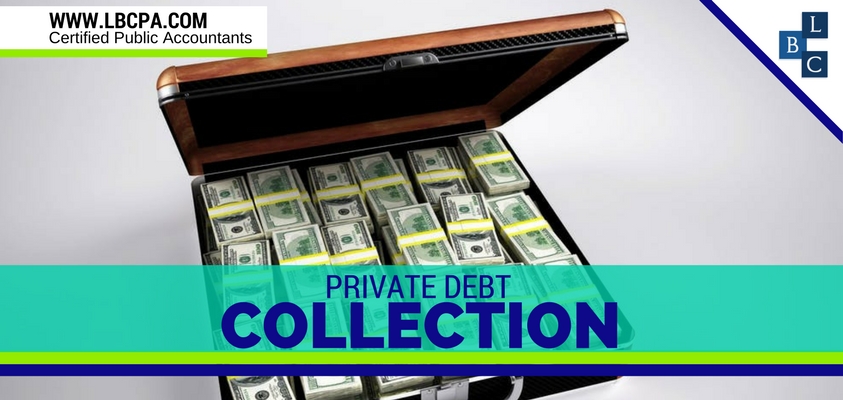LBCPA News 
Click here to go back
Private Debt Collection

The Internal Revenue Service began a new private collection program of certain overdue federal tax debts selecting four contractors to implement it.
The new program, authorized under a federal law enacted by Congress, enables these designated contractors to collect, on the government’s behalf, outstanding inactive tax receivables. Authorized under a federal law enacted by Congress in December 2015, Section 32102 of the Fixing America’s Surface Transportation Act (FAST Act) requires the IRS to use private collection agencies for the collection of outstanding inactive tax receivables.
General Information
As a condition of receiving a contract, these agencies must respect taxpayer rights including, among other things, abiding by the consumer protection provisions of the Fair Debt Collection Practices Act.
These private collection agencies will work on accounts where taxpayers owe money, but the IRS is no longer actively working them. Several factors contribute to the IRS assigning these accounts to private collection agencies, including older, overdue tax accounts or lack of resources preventing the IRS from working the cases.
The IRS will give taxpayers and their representative written notice that the accounts are being transferred to the private collection agencies. The agencies will send a second, separate letter to the taxpayer and their representative confirming this transfer.
Private collection agencies will be able to identify themselves as contractors of the IRS collecting taxes. Employees of these collection agencies must follow provisions of the Fair Debt Collection Practices Act and should be courteous and respect taxpayer rights.
The IRS will do everything it can to help taxpayers avoid confusion and understand their rights and tax responsibilities, particularly in light of continual phone scams where callers impersonate IRS agents and request immediate payment.
Private collection agencies will not ask for payment on a prepaid debit, iTunes or gift card. Taxpayers will be informed about electronic payment options for taxpayers on IRS.gov/Pay Your Tax Bill. Payment by check should be payable to the U.S. Treasury and sent directly to IRS, not the private collection agency.
The IRS will continue to keep taxpayers informed about scams and provide tips for protecting themselves. The IRS encourages taxpayers to visit IRS.gov for information including the “Tax Scams and Consumer Alerts” page.
Private Collection Agencies Selected
The IRS will assign cases to these private collection agencies:
CBE
P.O. Box 2217
Waterloo, IA 50704
1-800-910-5837
ConServe
P.O. Box 307
Fairport, NY 14450-0307
1-844-853-4875
Performant
P.O. Box 9045
Pleasanton CA 94566-9045
1-844-807-9367
Pioneer
PO Box 500
Horseheads, NY 14845
1-800-448-3531
If you do not wish to work with the assigned private collection agency to settle your overdue tax account, you must submit a request in writing to the private collection agency.
Accounts Not Assigned To Private Collection Agencies
IRS will not assign accounts to private collection agencies involving taxpayers who are:
Deceased
Under the age of 18
In designated combat zones
Victims of tax-related identity theft
Currently under examination, litigation, criminal investigation or levy
Subject to pending or active offers in compromise
Subject to an installment agreement
Subject to a right of appeal
Classified as innocent spouse cases
In presidentially declared disaster areas and requesting relief from collection
Private collection agencies will return accounts to the IRS if taxpayers and their accounts fall into any of these 10 situations after assignment to the private collection agencies.
Stay Vigilant Against Scams
The IRS urges you to be on the lookout for unexpected scam phone calls from anyone claiming to be collecting on behalf of the tax agency.
The IRS will do everything it can do to help you avoid confusion and ensure you understand your rights and tax responsibilities when it assigns your case to a private collection agency. This is particularly important in light of continuing scams where callers impersonate IRS agents and request immediate payment.
Even with private debt collection, you shouldn’t receive unexpected phone calls from the IRS demanding payment. When people owe tax, the IRS always sends several collection notices through the mail before making phone calls.
TIGTA Hotline
To make a complaint about a private collection agency or report misconduct by its employee, call the TIGTA hotline at 800-366-4484 or visit www.tigta.gov or write to:
Treasury Inspector General for Tax Administration
Hotline
Post Office Box 589
Ben Franklin Station
Washington, DC 20044-0589
To report a threat, assault or attempted assault by a private collection agency employee, contact the TIGTA Office of Investigations with responsibility for your geographic area.
If you have any questions regarding accounting, domestic taxation, international taxation, IRS representation, U.S. tax implications of Real Estate transactions or financial statements, please give us a call at 305-274-5811.
Source: IRS






